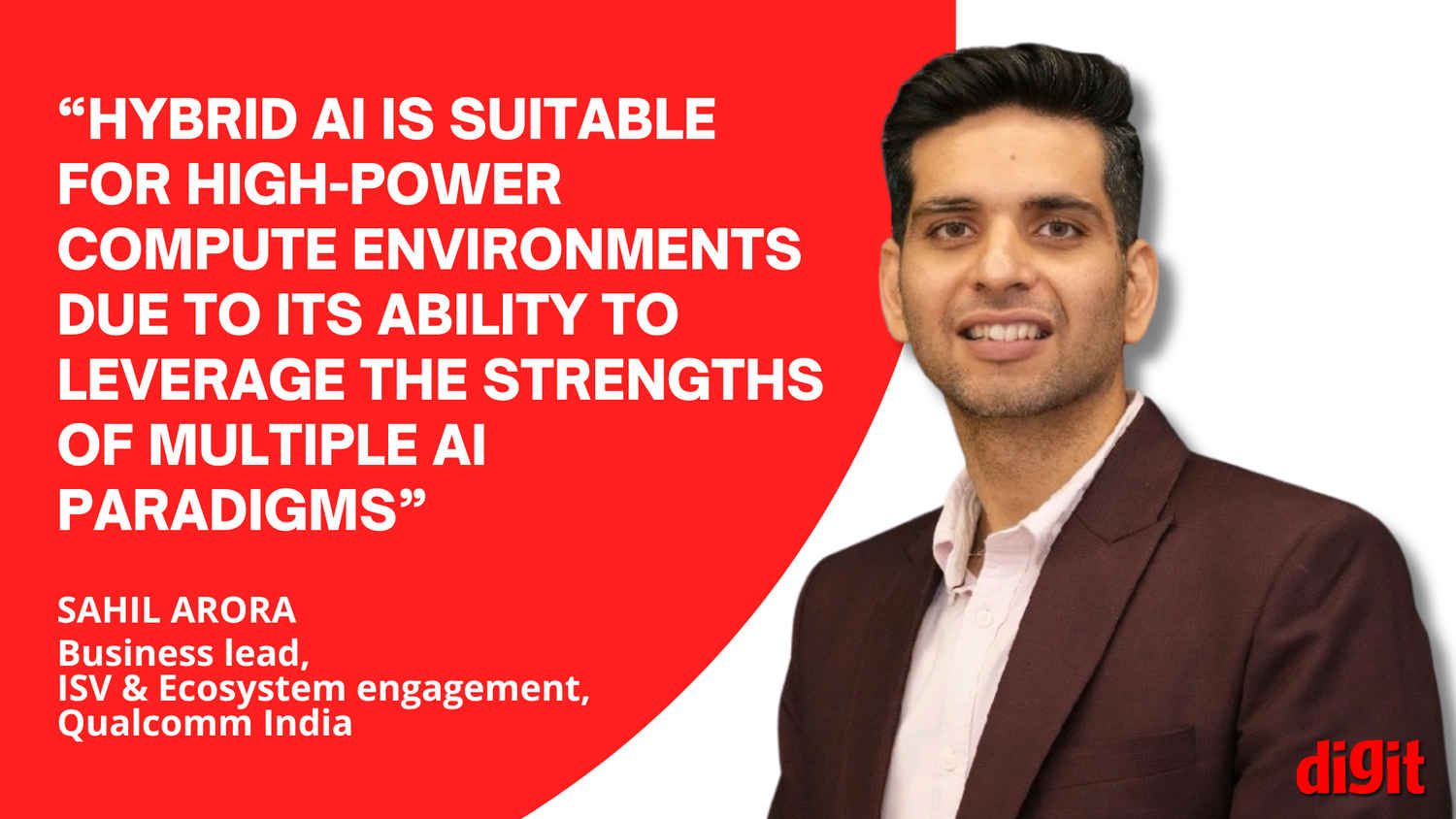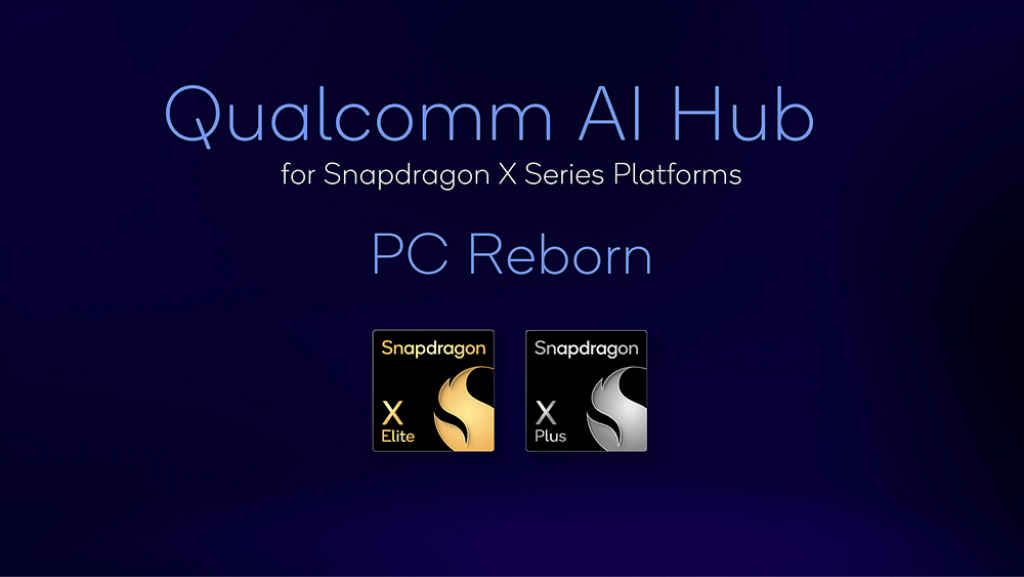Qualcomm India’s Sahil Arora believes – “Hybrid AI opens greater opportunities for AI adoption in India”

On the 23rd Anniversary of Digit Magazine, we invited stalwarts and leaders from the tech industry to give their perspectives on the role of AI (Artificial Intelligence) in India. Mr Sahil Arora, Business lead, ISV & Ecosystem engagement, Qualcomm India, shares his insights on how Hybrid AI would affect different workflows in the country by distributing the dependence of consumers on local and cloud processing for AI processes, improving their efficiency.
 Survey
SurveyAccording to Mr Arora, “Hybrid AI enhances performance and responsiveness through local edge processing – a great advantage when it comes to real-time applications. Together with 5G, it distributes AI workloads between cloud and edge devices.”
Here’s the full article below. The article was originally published in the June 2024 AI Special Anniversary issue of Digit magazine.
Technology adoption is by no means the most reflective benchmark of a country’s development, but it is certainly one of the most powerful catalysts of transformative change and socioeconomic progress. India, as an economy has gained prominence on the global stage in recent years with its accelerated digital transformation initiatives and focus on building a strong technology acumen. As we continue to expand our 5G ecosystem, more innovations using emerging technologies and building scalable solutions will be key in strengthening our position further. India’s phenomenal mobile growth has now reached a point where it writes its own story. Our smartphone and data growth has set an example of promoting digital inclusivity and bridging the gap among masses. Today, India has made significant progress on 5G subscriber penetration and the roll out of 5G services across the country in less than two years. The adoption of cloud and artificial intelligence (AI) is however a different matter. While the technology continues to flourish, what has been a challenge is its deployment while simultaneously ensuring data security and privacy in compliance with domestic and international regulations.

Hybrid AI enhances performance and responsiveness through local edge processing – a great advantage when it comes to real-time applications. Together with 5G, it distributes AI workloads between cloud and edge devices. Less complex tasks requiring low latency, or even the initial stages of complex processing, can be handled at the device level itself while the cloud takes on computationally extensive tasks or final model refinements. Offloading the processing burden from the cloud in this manner results in lower costs and faster response times. What’s more, it adapts to user preferences, thus enabling greater personalization.
These are important benefits, especially in a large, value driven and intensely competitive market like India. Consumers enjoy greater privacy and multimodal, context-aware, improved on-device AI experiences – most noticeably in areas such as gaming, AV content consumption, and photography – while enterprises benefit from greater operational efficiency, data security, cost savings, and access to new business opportunities. Hybrid AI can serve businesses of all sizes. For small companies looking for real-time actionable insights, hybrid AI enables a tighter feedback loop. In large companies, where streamlining operations is a priority, it can offer relevant predictive intelligence to guide process optimization.
Hybrid AI is suitable for high-power compute environments due to its ability to leverage the strengths of multiple AI paradigms, thereby enhancing efficiency, performance, and flexibility. It comes with frameworks that can scale efficiently across distributed computing environments, such as cloud-based platforms or high-performance computing clusters. This scalability is crucial for handling the computational needs of advanced AI tasks.
Hybrid AI’s capabilities that consume lower power also spotlight its contribution to sustainability. Hybrid AI can ensure sustainability by optimizing resource usage and reducing energy consumption through its ability to combine different AI paradigms effectively. This approach allows for dynamic workload distribution, ensuring that tasks are handled in the most power-efficient way. Moreover, hybrid AI can enhance predictive maintenance in various industries, leading to reduced waste and longer lifespans for machinery and equipment.
2023 saw generative AI come into the global spotlight. The next reasonable evolution of this will be hybrid AI. India’s large young workforce, socioeconomic diversity, ever-increasing mobile penetration, and ongoing digital transformation offer arguably the widest scope in the world for exploring the potential of the technology on multiple fronts. By prioritizing local language capabilities, developing affordable on-device solutions, and encouraging like-minded stakeholders to unite towards shared goals, India can use the power of hybrid AI to benefit all its industries and communities.

India has a huge talent pool in software engineering, and the private sector should work with the government, nonprofits, and educational institutions to build their skills and capabilities in cloud and AI. This skilled talent should then be channelized to develop hybrid AI and other advanced technologies and to create powerful, advanced applications that improve processes and outcomes across sectors and everyday activities. Indian developers and independent software vendors (ISVs) have a significant growth opportunity to maximize revenues by leveraging their technical expertise and the country’s competitive cost advantage. By developing innovative hybrid AI solutions that combine machine learning with rule-based systems and edge computing, they can cater to high-demand sectors like healthcare, agriculture, education, finance and manufacturing, offering tailored solutions that address specific industry needs. Collaborating with global tech giants and leveraging the provisions under Digital India and capitalizing on the growing AI startup ecosystem can further enhance their market reach.
An EY-FICCI report last year revealed that Indian organizations were investing significant amounts of money in cloud offerings to build or sustain their innovation momentum. It went on to suggest that, unless they adopted the cloud first, they would find it difficult to maximize the benefits of artificial intelligence (AI) for business. With robust, farsighted regulations that amplify its strengths and adequately address its associated risks and challenges, hybrid AI can play an important role in India’s mobile economy by unlocking new opportunities for businesses and empowering individuals. As India steps into the era of cloud and AI, hybrid AI offers the best of the two worlds.
Industry leader
Contributions from industry leaders and visionaries on trends, disruptions and advancements that they predict for the future View Full Profile